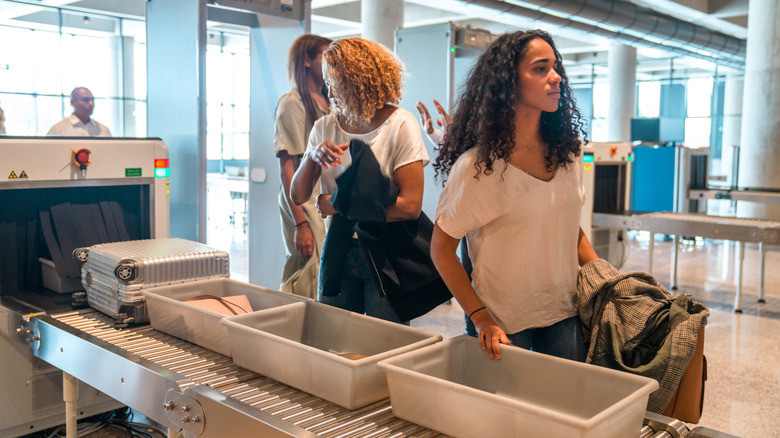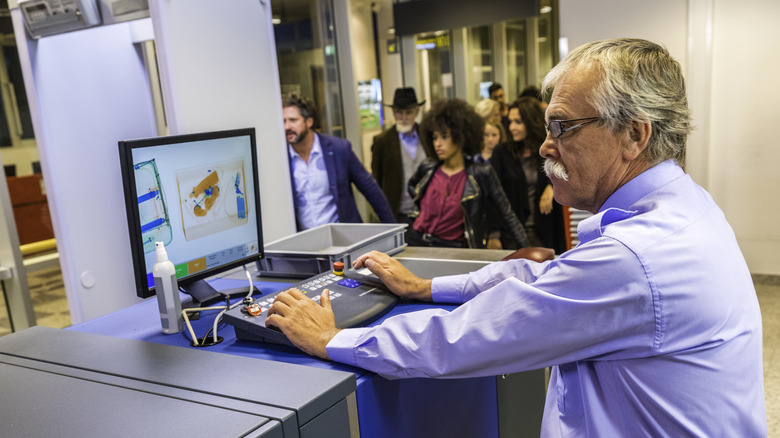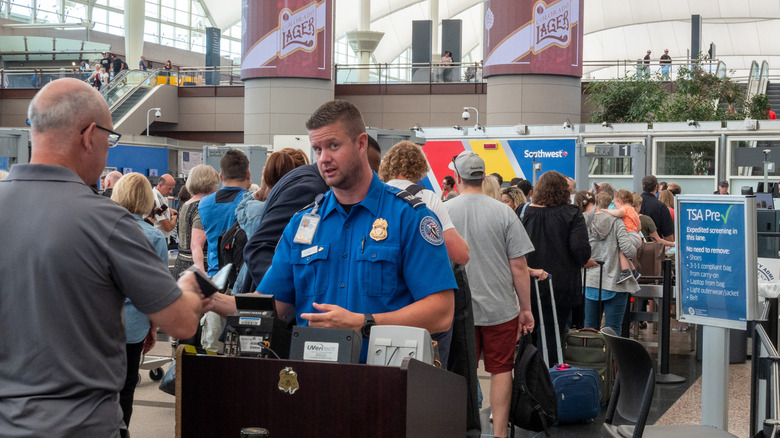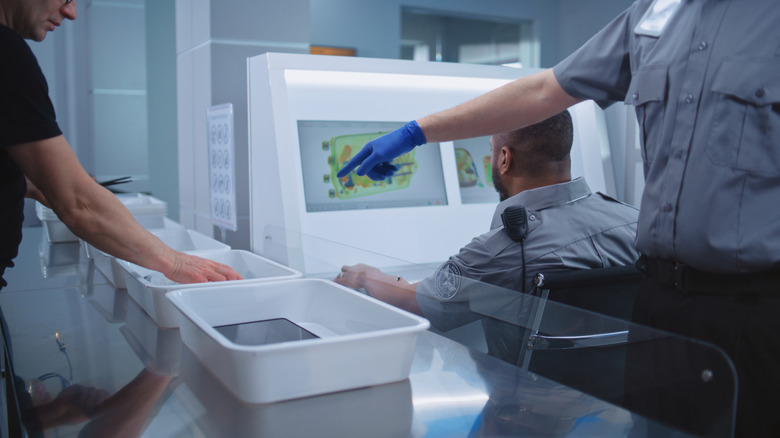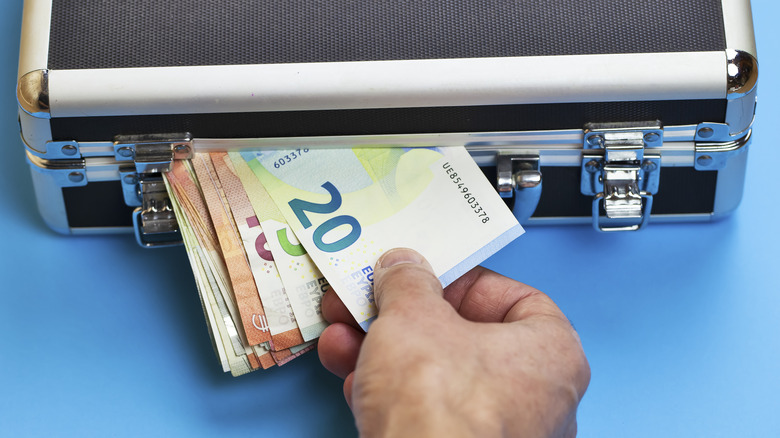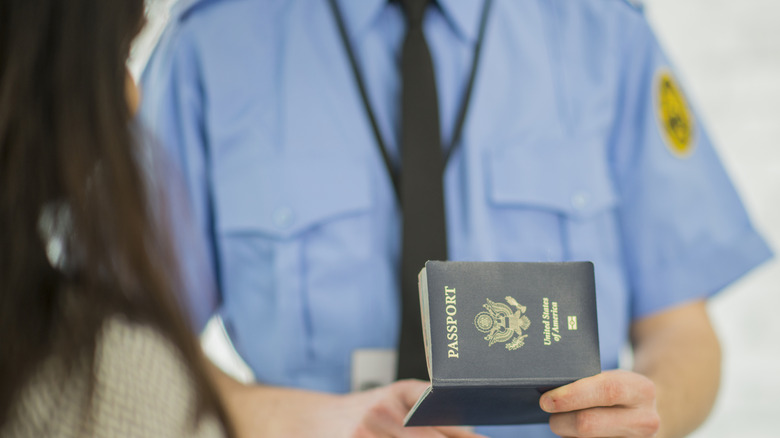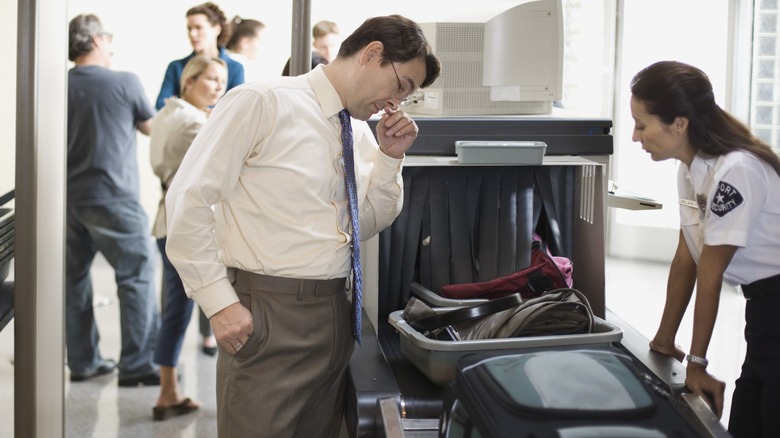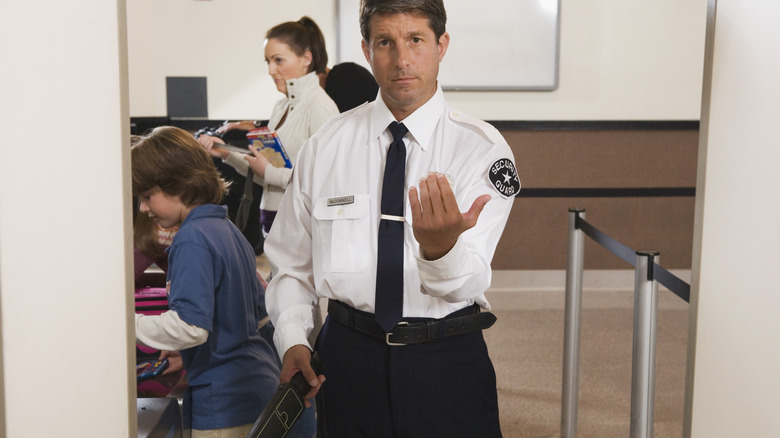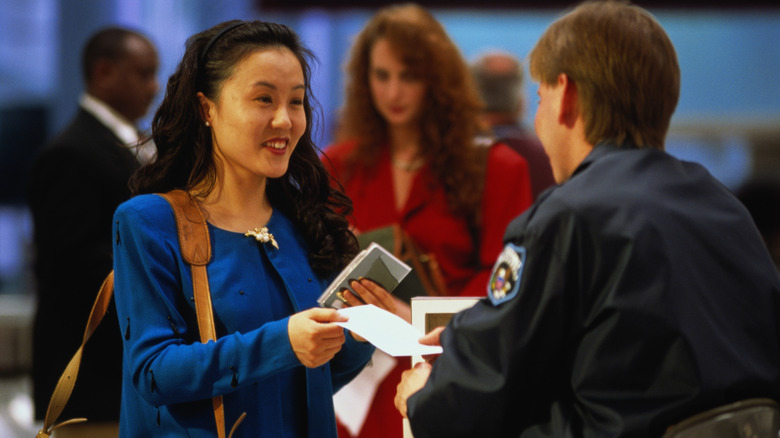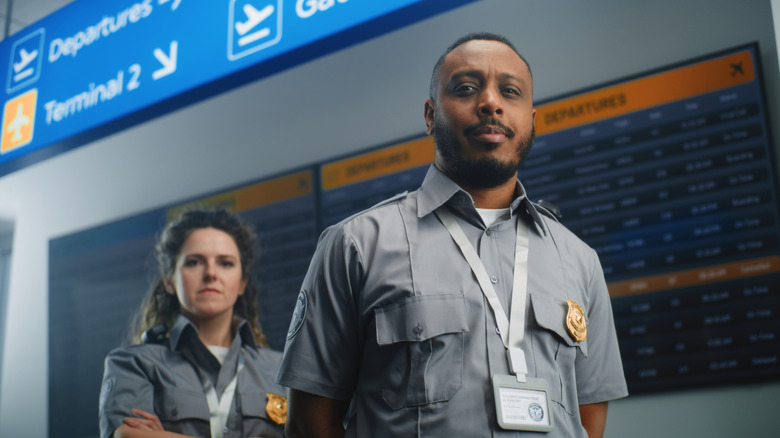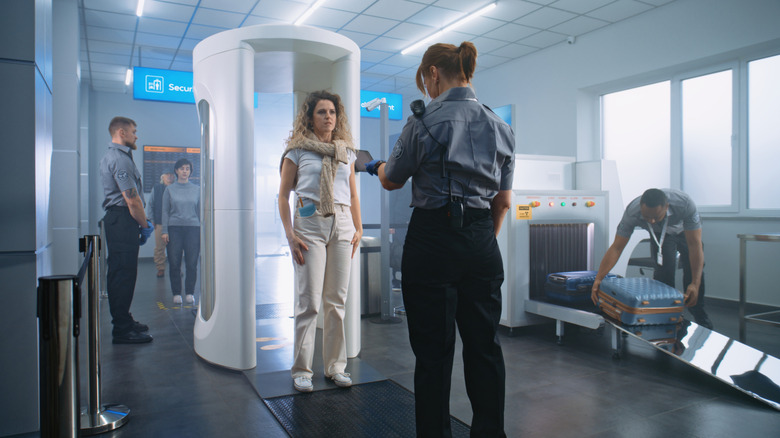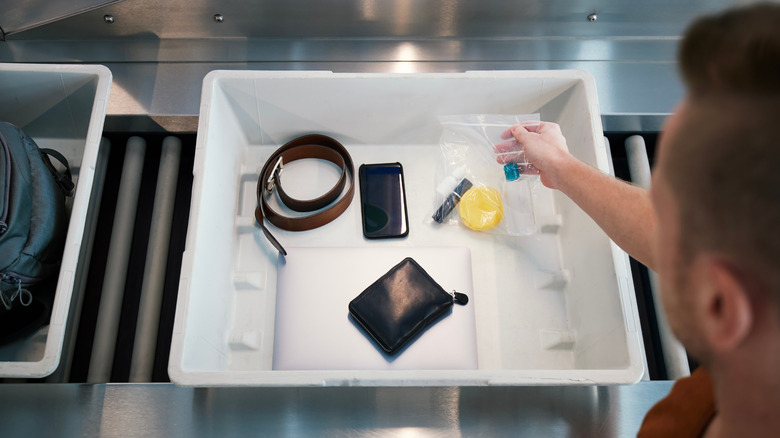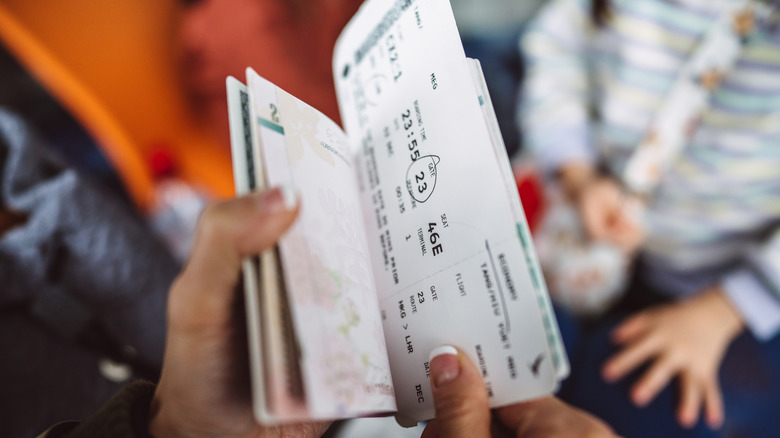Airport Security Secrets You Need To Know
While security is of the utmost importance at the airport, that doesn't mean it's an enjoyable process. From long lines to frustrating TSA inconsistences to uncomfortable pat downs, sometimes just making it onto your flight on time can seem like a battle. But it doesn't necessarily need to be like that.
There are many tips and tricks to surviving the airport and its security checkpoints, but sometimes the best way to deal with an issue is to understand it better. When you know some of the ins and outs, the whole process starts to feel less anxiety-inducing and more normal. Learning the secrets of airport security could make your next flight feel as easy breezy as the vacation on the other end.
Agents don't look for drugs
As the name suggests, airport security is primarily focused on, you know, security. All the scanners and machines are focused on finding anything that could compromise security on the plane. This means weapons, not illicit substances. Agents don't actively search for drugs, regardless of legality. This doesn't mean passengers should start taking liberties with transporting illegal substances, of course. (Or that TSA hasn't confiscated all kinds of bizarre items over the years.)
That might come as a surprise to many, although that might be preconceptions and airport security TV shows talking. To some, the main focus of airport security seems to be illegal substances and dramatic drug busts. The authorities are sometimes called on passengers in possession of contraband, but these substances are usually found while agents are looking for something more directly related to safety. TSA doesn't really care what you do in your spare time as long as you aren't a threat to the security of the airplane and the other passengers.
Agents rotate roles
If you think airport security is a thoroughly dull experience as you wind your way through the queues, spare a thought for the agents. They don't even get the minor novelty of putting their belongings in a security bin. For the security agents on duty, the day is a parade of watching ordinary people going on exciting adventures. Holiday envy is real. If you think a job with TSA is ideal for people who love to travel, think again.
In order to avoid errors, agents usually switch up their positions every 30 minutes. Agents often have experience operating the X-ray, checking tickets, and performing pat-downs as well. Doing the same monotonous task for too long can lead to security missing something, so this switch-up keeps agents fresh on the job and on their toes. There is only so long you can watch a queue of people, after all. Seriously, try it sometime.
Airport security isn't always secure
Unfortunately, even with all the technology and effort put into ensuring passenger safety, many items on the banned list still often find themselves making it through airport security. To test the frequency of this, the Department of Homeland Security sent undercover agents in 2015 into some of the country's busiest airports with fake explosives and banned weapons in their bags or on their persons. Frighteningly, about 95% of those items made it through security without detection — in 67 out of the 70 tests conducted, TSA agents failed to detect the items.
A lot has changed in the decade since that undercover experiment, but it is unreasonable to assume that airport security gets everything right all of the time. Humans are fallible, after all. When you consider the sheer amount of humanity that passes through airport security every day of the year, it is expected that some things will slip through the net.
Agents sometimes pocket your money
You won't believe how much money the TSA makes on leftover change, so you want to make sure you're keeping track of your money. In 2023 alone, the agency made almost $1 million from the change left behind by passengers at airport security. More and more establishments around the globe are embracing cashless ways of doing business, but cash is very much still a thing. After all, the amount left behind at TSA has almost doubled since 2012.
So, what does the TSA do with a million dollars in loose change? It was previously thought that the money was used to improve security, but the page explaining that on the TSA website has since disappeared. A bill was proposed that would require the TSA to donate the leftover pennies to charity, but it didn't pass. Where does all the money go? Maybe somewhere, maybe nowhere, but it's quite the chunk of change to find down the back of the sofa.
Job turnover is high
While the stats might not be as damning as they once were, the Transport Security Administration still sees a worryingly large turnover of staff. The TSA often ranks near the bottom of the list of federal agencies regarding job satisfaction, and it isn't too difficult to understand why. Going through airport security is painful enough for travelers; how bad must it be for people who have to spend their entire working day in that environment?
The TSA managed to cut its attrition rate with a major pay raise in 2023, but it is almost assumed that the numbers will revert to the mean once that honeymoon period wears off. After all, the only way was up from the miserable numbers of the early 2010s, when almost as many TSA agents left as were hired. The country's busiest airports saw job turnover ranging from 30 to 80%, a staggering number for a job with a vital role in national security.
No one really knows full standard operating procedure
The standard operating procedure of the TSA, also referred to as SOP, is hundreds of pages long. Of course, very few people working security have actually read the entire document, and even fewer remember all of it. Agents tend to use common sense and go by word-of-mouth when using their security knowledge, including when they make note of one of the things they notice immediately about passengers. As a result, you may find an agent not letting through an item that you know is allowed or even treating you in a way that is strictly against regulation. If this happens, you can ask your agent to call a supervisor and double-check the SOP.
It might sound odd that the people in charge of keeping the skies safe aren't entirely clued up on the ins and outs of their job, but it shouldn't really be taken like that. After all, how many of us know the intricate details of our jobs? We're not talking about just the processes; the SOP covers everything from security to uniforms and everything in between.
Security personnel have their own code
Not only are there official code words used by security agents, but many have even invented their own for use among their co-workers. Agents have been known to surreptitiously notify each other of attractive passengers using terms such as "hotel papa" or a specific number or alerting each other to annoying passengers using innocent-sounding terms. As a result, such fliers sometimes receive prolonged screenings.
As with any job, the longer people work together, the more cohesive their language becomes (taking into account all the turnover, of course). People working in such an environment will always find ways to personalize it, and the day-to-day existence of airport security is no different. It might sound a little unprofessional from time to time, but the intention isn't to devalue the role of an airport security officer. If anything, personalizing one's work environment is an active way to try and add extra meaning and importance to a job. In this case, it just so happens to involve funny words.
The job has some good moments
The TSA and other airport security around the world have been known to get some bad press, and it's not often that one hears about the happy moments security personnel experience while on the job. Despite the turnover, the stress, the need to constantly be on the lookout for danger, and the impatience of many travelers, it can actually be a fun place to work. It's not uncommon to meet at least one celebrity while on the job, as the rich and famous have to pass through airports — just like us! — every time they fly to yet another celebrity vacation hotspot. It is also not unheard of to see a pregnancy announcement or proposal in the security line.
Besides these random quirks, there are frequent reminders that people are — for the most part — a joy to behold. Airports are punctuated by random acts of kindness by ordinary people, and a seemingly mundane conversation can make one's day. You never know when a little joy will make its way into your day.
TSA agents can get tenure
Upon hiring, TSA agents are automatically put in a two-year probationary period, during which they must receive regular training and performance reviews. After this two-year period, an agent's job is generally secure, making it very difficult to fire them unless they commit a crime. A tenured TSA agent has even been referred to as a "made" man or woman within the industry, a term used for fully initiated mafia members.
Of course, new hires need to make it through those two years first, and the turnover suggests that is easier said than done. It probably isn't entirely wise to draw lines from the mafia to a government agency either, but what's done is done. If you pass your probationary period with TSA, you are pretty much set up for life in the job, provided it is what you want to spend the rest of your days doing.
TSA agents can't arrest you
Airport security can be nerve-wracking, especially if you're put through additional screening, such as pat-downs. Even if you are fully aware that you have committed no crime, have ticked every box, and covered every possible outcome, there's still always a nagging feeling that this is the moment you'll have to recount on an episode of "Locked Up Abroad." This is it. This is the moment.
Of course, everything is almost always fine, but if you're worried that you may have packed something sharp or exceeding liquid limits by accident, you don't need to worry too much. While TSA agents may try to hold you until police arrive, they operate on consent — implied or expressed — meaning that passengers are free to leave the airport entirely if security doesn't allow them through the checkpoint. Airport security isn't some sort of purgatory. You can always go back. There's probably no need to prepare that talking head speech just yet.
Your belongings may be sold
Items forgotten by passengers or left behind after airport security does not allow them through aren't always thrown into the trash. Quite the opposite, in fact. These items are often collected and later sold at special auctions. After all, these items have to be dealt with. Otherwise, the agency would end up with a constantly increasing mass of things that would gather dust and take up space. Gotta get rid of it somehow, right? Why not an auction?
Knives, nunchucks, spears, and other odd items that have been brought through security are collected every day by screeners, shipped to other states, and then sold at local government surplus stores or online for a profit. If your bag goes missing or is unclaimed, there's even a store that sells lost luggage. Wait, so TSA is pocketing a million in loose change and selling missing items at auction? There are some things we wish we never found out, and this is very much a big fact on that all-too-long list. But at least now we know why some TSA checkpoints don't make you take out your laptop.
Your ticket may have marked you as suspicious
Right before you enter the security checkpoint, an airport security agent will mark your ticket with their badge number, initials, or some other indication of who screened you. If this person finds you suspicious in some way, they may also mark your boarding pass to let other checkpoint officers know that you should receive additional screening as a result of some sort of behaviors (or maybe even what you wore to the airport) that have marked you as a suspicious passenger.
You can mark this under the list of airport security secrets that make a lot of sense. After all, if the initial agent turned around and shouted, "Hey, this guy is a little weird," it is fair to say that wouldn't go down too well. Like all agencies, the TSA uses its own method of staying on top of the mass of humanity going through airport security at all hours of the day. If it means the skies remain safe, we have no complaints whatsoever.
